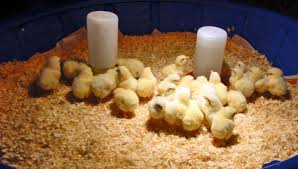Raising chicks is a fun and rewarding process for the whole family. There is a lot of information out there about how to raise chicks, but there are a few things most articles leave out.
Secrets to Raising Strong Chicks
If you pay attention to these special tips about raising chicks you will end up with a healthy, productive flock.
How to care for chicks, what you really need to know:
1. Temperature in the Brooder is More Important than You Think
It really is essential that you keep the brooder at 95°F during the first week, and gradually reduce it by 5°F each week thereafter. Equally important when raising chicks is to give them the option to be warmer or cooler. Do this by placing the heat source (usually a light bulb) at one end of the brooder to create hot and cool pockets.
2. Clean Water at ALL Times is Essential for Health
Chicks make a mess of their water, but keeping a clean supply constantly available is essential. They won’t drink dirty water. Dehydrated chicks chill easily, are apt to get sick and lose their appetite which causes them to grow more slowly. A good chick waterer will make your job much easier.
3. Raising Chicks in a Large Group is Better
If you are raising chicks you should have more than three. Larger groups of chicks encourage curiosity. They eat and drink more and are more energized. Just make sure that small or weak chicks are able to get to the food and water.
4. Raising Chicks with Probiotics
Until hatching, chicks were protected in a sterile environment inside the egg. Help them cope with the stresses of being exposed to all the organisms in the brooder by feeding them a little yogurt at least once a week. Yogurt or another probiotic will also help the chicks fend off coccidiosis, a potentially fatal infection that anyone raising chicks must work to avoid.
Learn all about what to feed baby chicks here.
5. Keep Chick Saver on Hand
A chick saver product like Save-a-Chick Powder will make raising chicks much less stressful. Simply add this vitamin supplement to their water when you have weak or dull chicks. Chick savers are high in Vitamin B that will revitalize a sick chick and encourage her to eat. It also works wonders on older chickens that fall ill.
6. Make Sure Very Young Chicks Eat and Drink
You have to be the mother hen if you are raising chicks hatched from an incubator. They need you to show them how to eat and drink. Gently dip each chick’s beak into the food and water. Keep a close eye on them and repeat the process if they don’t start eating on their own.
Related: Raising Baby Chicks Week by Week

Image courtesy of ferrinbrookfarm.com
Secrets for Raising Chicks in Winter
While it is easier raising chicks during the rest of the year, it can be done in the frigid snowy months as well.
Here are some tips on how to raise chicks in the winter:
- Prepare a Warm Place for the Brooder
In the Southern states it is actually easier to keep the brooder warm in the winter than it is to keep it cool in the sweltering heat of summer. - Make Gradual Changes
The chicks can go out to the coop when they are fully feathered, but make the transition slowly so they don’t become shocked by the cold. - Use Deep Bedding
Raising chicks after the first few months is usually straightforward as they join the rest of the flock. But in the winter they will need extra help. Use extra deep bedding in the coop and be prepared to provide a supplemental heat source like a lamp or heating pad if the weather turns especially nasty.
Raising chicks in the fall might be the best option of all. Changes in daylength will postpone the onset of laying by a month or two, allowing the hens to finish growing before spending energy making eggs. By raising chicks in the fall you’ll end up with hens that lay larger, stronger eggs throughout their lifetime.

I am pretty sure they will grow to be chickens and it would be a great idea to put them in one of these: Chicken tractors
Extended Reading
Baby Chicks: The Complete Guide
Learn how to make a simple DIY chick waterer and feeder out of household items:

